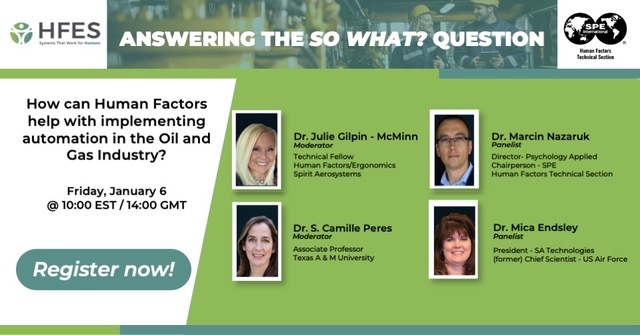
Answering the "So What Question" Webinar Series: How Can Human Factors Help With Implementing Automation in the Oil and Gas Industry?
-
Register
- Non-member - Free!
- Member - Free!

The better the automated systems are, the lower the situation awareness of the human operators and the less likely that they will be able to take over manual control when needed. This is one of the ironies of automation.
At the same time, automated systems are rapidly growing in popularity in the oil and gas sector due to their many advantages, from reducing mistakes to improving efficiency. However, as the science from situation awareness has found, these systems introduce new challenges and risks.
As a kickoff to the new MOU between the Society of Petroleum Engineers Human Factors Technical Section (SPE-HFTS) and HFES, two panelists—Dr. Mica Endsley and Dr. Marcin Nazaruk—will discuss how the science of situation awareness can be applied and translated to the complexities of the oil and gas sector.
Dr. Endsley will introduce the “human-autonomy systems oversight model” presented in her paper, From Here to Autonomy. This was developed based on several decades of applied research that includes out-of-the-loop performance problems, monitoring, and trust, among many others.
Dr. Nazaruk will present some of the design challenges in the oil and gas sector, which are currently being addressed through automation. The webinar will provide an opportunity to discover and discuss some key solutions for reducing the risk of human performance issues when interacting with autonomous systems, such as human-automation interface features, central automation interaction paradigms comprising levels of automation, adaptive automation, and granularity of control approaches.
Moderator: Camille Peres (Moderator)
Associate Professor
Texas A&M University
Julie Gilpin-McMinn (Moderator)
Technical Fellow Human Factors/Ergonomics
Spirit Aerosystems, Inc.
Dr. Marcin Nazaruk
Dr. Marcin Nazaruk specializes in safety transformation through the practical application of human factors, human performance, and safety 2. Marcin held a number of senior leadership roles in the energy industry focused on the practical and scalable implementation of human performance strategies, tools, and solutions. Nazaruk has an applied PhD in human factors and a broad range of advanced qualifications in management (MBA), industrial psychology, systems thinking, culture change, or behavioral science. The multidisciplinary approach led to innovative but highly practical solutions that attracted multiple industry awards. He is the author of multiple industry guides published by the IOGP, SPE, or Energy Institute and is the world’s only person who chaired the four most prestigious human factors working groups in the energy industry. Learn more on www.learningfromnormalwork.com
Dr. Mica Endsley
Dr. Mica Endsley is President of SA Technologies and is the former Chief Scientist for the US Air Force. She has also held the positions of Visiting Associate Professor at MIT in the Department of Aeronautics and Astronautics and Associate Professor of Industrial Engineering at Texas Tech University. Dr. Endsley is a Fellow and Past-President of the Human Factors and Ergonomics Society. She received a Ph.D. in Industrial and Systems Engineering from the University of Southern California. Dr. Endsley is a recognized world leader in the design, development and evaluation of systems to support human situation awareness (SA) and decision-making, and the integration of humans and automation. She has authored over 200 scientific articles and is the co-author of Analysis and Measurement of Situation Awareness and Designing for Situation Awareness and recently published Situation awareness measurement: How to measure situation awareness in individuals and teams.